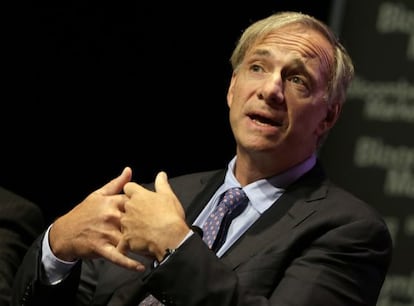“China is dealing with a heart transplant,” says Bridgewater head
Boss of world's biggest hedge fund offers his views on Spain and the Chinese crisis

The markets never let you rest, not even when you’re on holiday in Mallorca – and even less if you happen to run a company that manages approximately $169 billion in global investments, the equivalent of around 13.5% of Spain’s GDP.
Ray Dalio, chairman of Bridgewater, the world’s biggest hedge fund, spoke with EL PAÍS, by phone, during his stay at his vacation home in Puerto de Andratx on the Balearic Island and provided his own views on Spain, the Chinese market crisis, the Greek bailout and other issues on the global political and economic agenda. The 66-year-old New York native says history repeats itself again and again, and that if we understand the way the economy works, as he relates in his own video, we will know how to pull out of the current situation.
Question. Why did Bridgewater change its views on China?
My concern about Spain, and about Europe in general, is that impatience may lead to radical changes that will cause disastrous results”
Answer. The situation in China is complicated. I published a very extensive report that was leaked and taken the wrong way. What the report said is that the bursting of the stock market bubble in China has added an additional negative element to its economy in the short term, which adds to the need to restructure much of China’s debt and economic model. But in the long run its outlook is good. Its debt is denominated in its own currency and it has large reserves. But the old engines of economic growth are no longer working. For years the economy has grown at an average annual 10.3%. Out of that, three points represented growth in infrastructure, but now they have excess capacity; another three points were exports, which have now lost competitiveness, and 1% represented a housing demand that no longer exists. They are at a transitional point, as the United States also was at one moment, and that has an effect on the rest of the world. This is what we see reflected in the bursting of the raw materials bubble and the weakness in countries that export to China.
Q. Does that meant that the stock market crisis is more serious than some people would make us think?
A. Let’s say that China is dealing with a heart transplant. That’s a serious operation that requires skilled management.
Q. Against that backdrop, what are some possible consequences of the change in monetary policy planned by the Federal Reserve?
A. The dollar plays a double role as US currency and as the world’s reserve currency. That is why much of global debt is denominated in dollars. The problem is that the Fed applies its monetary policy with its eyes on the United States. The world needs a lax monetary policy, not a restrictive one. I think the US is making a serious mistake in considering raising interest rates now, and I doubt it can raise the price of money more than 25 basis points without some major consequences. I am more concerned about the excessive world debt and deflationary pressure, and to what extent central banks can be effective with such low interest rates and such high asset prices.
Video: Ray Dalio explains how the economy works.
Q. Some large emerging economies such as Brazil are already suffering that scenario.
A. If you are indebted in dollars and your economy is linked to the production of raw materials or to Chinese exports, or both, the world is going to be a very difficult place for you. That is without doubt Brazil’s situation, but also that of other countries.
Q. Will the third Greek bailout be the definitive one?
A. Both Greece and its creditors are in a very difficult and rather unique situation. In the last century, only the Great Depression in the US has had a tougher impact on the economy than the financial crisis has had on Greece, and nobody has emerged from a crisis with such a burden of debt, even though the relief measures have been greater than in other cases. But the Greek government was pretty naïve to think that it could unilaterally stop paying the institutions and that those same bodies would keep on providing financing. That mistake made the situation even worse, triggered a capital flight, deteriorated the banks’ balance sheets and raised the bailout amount by $12 billion. That is the lesson that other debtors should take away.
Q. Is it sustainable without a deep debt restructuring, as the International Monetary Fund (IMF) says?
A. The suffering experienced by citizens and the high burden of debt justify a restructuring. The IMF, the European Central Bank (ECB) and even Germany are being accused of cruelty against Greece, but when you have too much debt, both the creditor and the debtor must suffer. Creditors have already accepted significant losses in Greece, and it is politically impossible for them to accept more.
Q. Has the European project lost credibility?
A. The European project is being put to the test. Europe is redefining its rules in a trial-by-error process. For instance, the ECB can now adopt measures that seemed unthinkable at first, such as buying 60 billion of debt a month. But we should not lose sight of the lessons we have learned.
Q. Such as?
A. We need to be wary of the kind of extremism that can make an already difficult situation even worse. I understand people’s impatience and anger at the cuts, but they should avoid a drift towards a naïve kind of radicalism. I hope Spaniards will not forget the terrible and ruinous consequences we have seen in Venezuela, and that they will remember the destructive confrontation of both extremes during the Civil War. My concern about Spain, and about Europe in general, is that impatience, while understandable, may lead to radical changes that will cause disastrous results. Although I don’t think that is the most likely scenario, the mere possibility of it is already the worst-case scenario.
Tu suscripción se está usando en otro dispositivo
¿Quieres añadir otro usuario a tu suscripción?
Si continúas leyendo en este dispositivo, no se podrá leer en el otro.
FlechaTu suscripción se está usando en otro dispositivo y solo puedes acceder a EL PAÍS desde un dispositivo a la vez.
Si quieres compartir tu cuenta, cambia tu suscripción a la modalidad Premium, así podrás añadir otro usuario. Cada uno accederá con su propia cuenta de email, lo que os permitirá personalizar vuestra experiencia en EL PAÍS.
¿Tienes una suscripción de empresa? Accede aquí para contratar más cuentas.
En el caso de no saber quién está usando tu cuenta, te recomendamos cambiar tu contraseña aquí.
Si decides continuar compartiendo tu cuenta, este mensaje se mostrará en tu dispositivo y en el de la otra persona que está usando tu cuenta de forma indefinida, afectando a tu experiencia de lectura. Puedes consultar aquí los términos y condiciones de la suscripción digital.









































